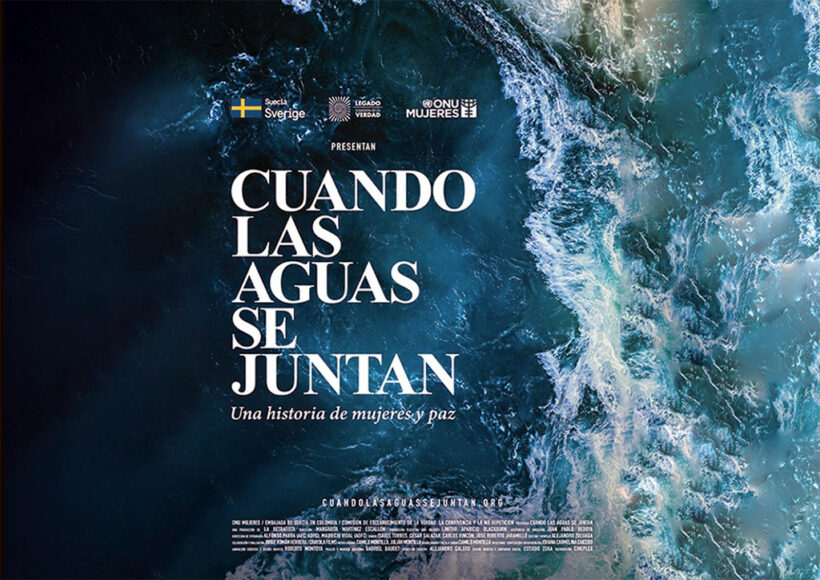” She doesn’t give up as long as she has a heart. She doesn’t give up as long as she has a reason”. One hour and 25 minutes of reflections, voices that cry, that evoke, that spill out and get up again. Women’s voices that converge like rivers. Survivors. Let no one confuse scar with defeat, or grave with oblivion. Let no one believe that the women of Colombia were defeated by the war. It is one thing to have a piece of history shattered, and another to give up… to give up… to give up.
27 March 2023, El Espectador
‘Cuando las Aguas se Juntan’ is much more than a documentary. It is a whisper that cries out from within, from turbulence and pain, from abandonment and courage, from orphanhood and lead.
The waters come together and become great and mighty rivers. Women come together and become – we become – a mixture of tenderness and strength, of courage, mourning, nostalgia and resistance. “There is no dignified life for women if we are not together”, is the slogan from Guajira to Putumayo, from Chocó to Catatumbo. They say it to peasant, indigenous and Afro-descendant women. They say it social leaders and ministers; craftswomen, violinists and doctors; artists, coca growers and weavers.
They say it mothers of sons and daughters, mothers of suffering and consolation, mothers of healing, embraces and reconciliation. Mothers of the hollowness left by war, mothers of silence, of chants and drums. Daughters and mothers of the earth.
‘Cuando las Aguas se Juntan’ was launched a few days ago in Spain and in several cities in Colombia. The film was made possible thanks to UN Women and Margarita Martínez, a Colombian film director who has travelled around our country and wept for the 6,402 boys murdered in infamy and asked herself why there are eight million victims and why we have been so stubborn about war. How did we allow more than 60 years of armed conflict, which cracked our lives and our geography? And he has also seen how we have stitched up our wounds, and he knows that to be builders of peace we have to be even more stubborn than to lead a war.
Serrat would say that Margarita “is as small as the wind“; perhaps that is why she has enough life to cross jungles, seas and mountains and get straight to people’s hearts so that they can tell her what life and death have been like in the villages of Colombia; how bullets ring out in the early hours of the morning and how a child’s heart is torn apart when his mother is murdered at the door of his eyes and his house.
Margarita Martínez – with the support of UN Women, the Swedish Embassy in Colombia and the Truth Commission – collected for this documentary inspirations and testimonies that should be known inside and outside our country. So that no one will ever ask her again if there was or was not an armed conflict in Colombia; so that no one dares to think that discrimination is tolerable, that poverty is just another part of the landscape, and war is an inevitable predestination. And that the world knows who the “Weavers of Life” of Putumayo are, and the courage of the leaders of “Narrating for Living” in Montes de María, and what “Ruta non-violent” is, and why the mothers of Soacha are invincible; and how “AMOR” – Association of Women of Eastern Antioquia – works for women and for the territory, big house, urgent embrace.
Bravo, Margarita! for bringing together the rivers of all waters. Being citizens means no longer dividing ourselves between victims and perpetrators. It is not acceptable to bow our heads or live dead amidst fear, disappearance and torture. You managed to make the voice of unity heard, unstoppable, from the Atrato to the Amazon, like a breath of life and a commitment to peace.










